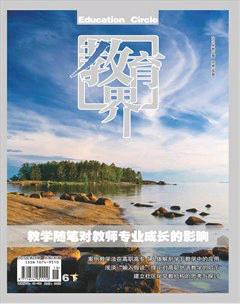Exploring the importance of teacher—student interactionin EFL graduates’oral English class
2015-08-18陈圆
陈圆
Abstract:This paper analyzes teacher-student interaction situation in one foreign studies university graduate students oral English class and seeks to investigate students opinions of role of teacher-student interaction. The author has designed six interview questions for the study. Answers to the interviews have revealed that most students regard teacher-student interaction as important and necessary for postgraduates oral English class.
Key words: teacher-student interaction graduate students oral English class
I.Introduction
Constructing a harmonious classroom where teachers and students can have interactions is widely advocated. In this paper, the author mainly focused on the postgraduate students opinions of teacher-student interaction. The present study has stated the necessity and importance of teacher-student interaction in oral English class.
II.Literature review
In Longs (1983) interaction hypothesis, he emphasized the role played by the interaction in making input comprehensible. According to M. H. Long (1996), by interaction, students can enlarge their language store. H. D. Brown(2001)holds that interaction is the collaborative exchange of thoughts, feelings, or ideas between two or more people resulting in a reciprocal effect on each other.
Three research questions were formed to guide the study:
1.What was the situation of teacher-student interaction in oral English class where participants attended last semester?
2.What did the participants think of the role of teacher-student interaction in oral English class?
3.In what aspects can teacher-student interaction help improve students oral English proficiency?
III.Methodology
3.1Context and participants
The study was conducted in an oral English class at one foreign studies university in 2014 and the interviews were carried out in different periods. All the participants are English majors majoring in different directions.
3.2Data collection and analysis
The author designed six questions to conduct interviews on the participants to get the data.
IV.Findings
4.1Situation of teacher-student interaction (research question 1)
According to the authors classroom observation and based on interviewees answers, it can be easily concluded that the teacher-student interaction situation is not very satisfying. We can get it from the following participants answer:
A: Only several students are very active in interacting with the teacher.
D: Sometimes the teacher has many interactions with the students but sometimes there are few interactions
4.2Role of teacher-student interaction in oral English class (research question 2)
As to students thoughts about teacher-student interaction, nearly all participants regarded teacher-student interaction very important in oral English class. Answers to this research questions can be seen as followed:
C: It can activate the atmosphere; facilitate teacher-student communication.
E: its important. In oral English class, you must speak English.
F: Its important. It can raise students awareness of speaking English.
4.3Teacher-student interaction helps improve oral English proficiency (research question 3)
The last research question is about in what aspects can interaction help improve oral English. Participants have provided different kinds of answers. Here, the author listed some answers.
A: Teacher-student interaction may help them to some extent in vocabulary size.
C: It is helpful to students oral English proficiency both in speaking content and speaking patterns of oral English.
V.Conclusion and discussion
Teacher-student interaction in the observed classroom is not favorable for graduate students foreign language production. English teachers are advised to increase the use of more favorable negotiation devices, questions and feedback. Teacher-student interaction is important and can help improve students oral English proficiency. Teachers and learners need to make the most use of interaction to achieve their own teaching or learning goals.
【References】
[1]H.D.Brown. Teaching by Principles: An Interactive Approach to Language Pedagogy. Beijing: Foreign Language Teaching and Research Press,2001.
[2]M.H.Long.Native Speaker /Non-native Speaker Conversation and the Negotiation of Comprehensible Input Applied Linguistics ,1983.
[3]M.H.Long.The Role of the Linguistics Environment in Second Language Acquisition. Handbook of Second Language Acquisition San Diego Academic Press,1996.
